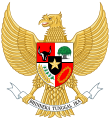Regional Representative Council: Difference between revisions
m Removing party of chairman - members are elected as and sit as individuals, not party members |
Reworded section on 'upper chamber', added refs |
||
| Line 28: | Line 28: | ||
}} |
}} |
||
{{Politics of Indonesia}} |
{{Politics of Indonesia}} |
||
The '''Regional Representative Council''' ({{lang-id|Dewan Perwakilan Daerah}}) (DPD) is |
The '''Regional Representative Council''' ({{lang-id|Dewan Perwakilan Daerah}}) (DPD) is one of two [[parliamentary chamber]]s in [[Indonesia]]. Together with the [[People's Representative Council]], it makes up a third chamber, the [[People's Consultative Assembly]].<ref name="Denny369">Denny Indrayana (2008), p369</ref> |
||
The DPD was created by the |
The DPD was created by the third amendment to the 1945 [[Constitution]] of [[Indonesia]] enacted 9 November 2001 in a move towards [[bicameralism]]. The DPD does not have the revising powers of an [[upper house]] like the [[United States Senate]]. Article 22D restricts the DPD to dealing with bills on "''regional autonomy, the relationship of central and local government, formation, expansion and merger of regions, management of natural resources and other economic resources, and Bills related to the financial balance between the centre and the regions.''"<ref name="Denny446">Denny Indrayana (2008), p446</ref><ref name="UU10">Law No. 20/2008 on Elections</ref> |
||
The DPD can propose such bills to the [[People's Representative Council]] (''Dewan Perwakilan Rakyat''/DPR) and must be heard on any regional bill proposed by the DPR. Each province elects 4 members to the DPD on a non-partisan basis, although many candidates in the April 2004 election had links to the parties represented in the People's Representative Council, the ''Dewan Perwakilan Rakyat'' or DPR. |
The DPD can propose such bills to the [[People's Representative Council]] (''Dewan Perwakilan Rakyat''/DPR) and must be heard on any regional bill proposed by the DPR. Each province elects 4 members to the DPD on a non-partisan basis, although many candidates in the April 2004 election had links to the parties represented in the People's Representative Council, the ''Dewan Perwakilan Rakyat'' or DPR. |
||
A third legislative body, the [[People's Consultative Assembly]] ({{lang-id|Majelis Permusyawaratan Rakyat}}) (MPR), comprises the members of the DPR and the DPD. |
A third legislative body, the [[People's Consultative Assembly]] ({{lang-id|Majelis Permusyawaratan Rakyat}}) (MPR), comprises the members of the DPR and the DPD. |
||
==Reference== |
|||
*Denny Indrayana (2008) ''Indonesian Constitutional Reform 1999-2002: An Evaluation of Constitution-Making in Transition'', Kompas Book Publishing, Jakarta ISBN 978-979-709-394-5 |
|||
===Notes=== |
|||
{{reflist}} |
|||
==External links== |
==External links== |
||
Revision as of 15:19, 17 May 2009
Regional Representative Council Dewan Perwakilan Daerah | |
|---|---|
 | |
| Type | |
| Type | |
| Leadership | |
Chairman | Ginandjar Kartasasmita since 1 October 2004 |
| Seats | 128 |
| Elections | |
Last election | 5 April 2004 |
| Meeting place | |
| Jakarta, Indonesia | |
| Website | |
| www.dpd.go.id | |
| This article is part of a series on the |
| Politics of Indonesia |
|---|
 |
The Regional Representative Council (Indonesian: Dewan Perwakilan Daerah) (DPD) is one of two parliamentary chambers in Indonesia. Together with the People's Representative Council, it makes up a third chamber, the People's Consultative Assembly.[1]
The DPD was created by the third amendment to the 1945 Constitution of Indonesia enacted 9 November 2001 in a move towards bicameralism. The DPD does not have the revising powers of an upper house like the United States Senate. Article 22D restricts the DPD to dealing with bills on "regional autonomy, the relationship of central and local government, formation, expansion and merger of regions, management of natural resources and other economic resources, and Bills related to the financial balance between the centre and the regions."[2][3]
The DPD can propose such bills to the People's Representative Council (Dewan Perwakilan Rakyat/DPR) and must be heard on any regional bill proposed by the DPR. Each province elects 4 members to the DPD on a non-partisan basis, although many candidates in the April 2004 election had links to the parties represented in the People's Representative Council, the Dewan Perwakilan Rakyat or DPR.
A third legislative body, the People's Consultative Assembly (Indonesian: Majelis Permusyawaratan Rakyat) (MPR), comprises the members of the DPR and the DPD.
Reference
- Denny Indrayana (2008) Indonesian Constitutional Reform 1999-2002: An Evaluation of Constitution-Making in Transition, Kompas Book Publishing, Jakarta ISBN 978-979-709-394-5
Notes
External links
- DPD homepage (Indonesian)
